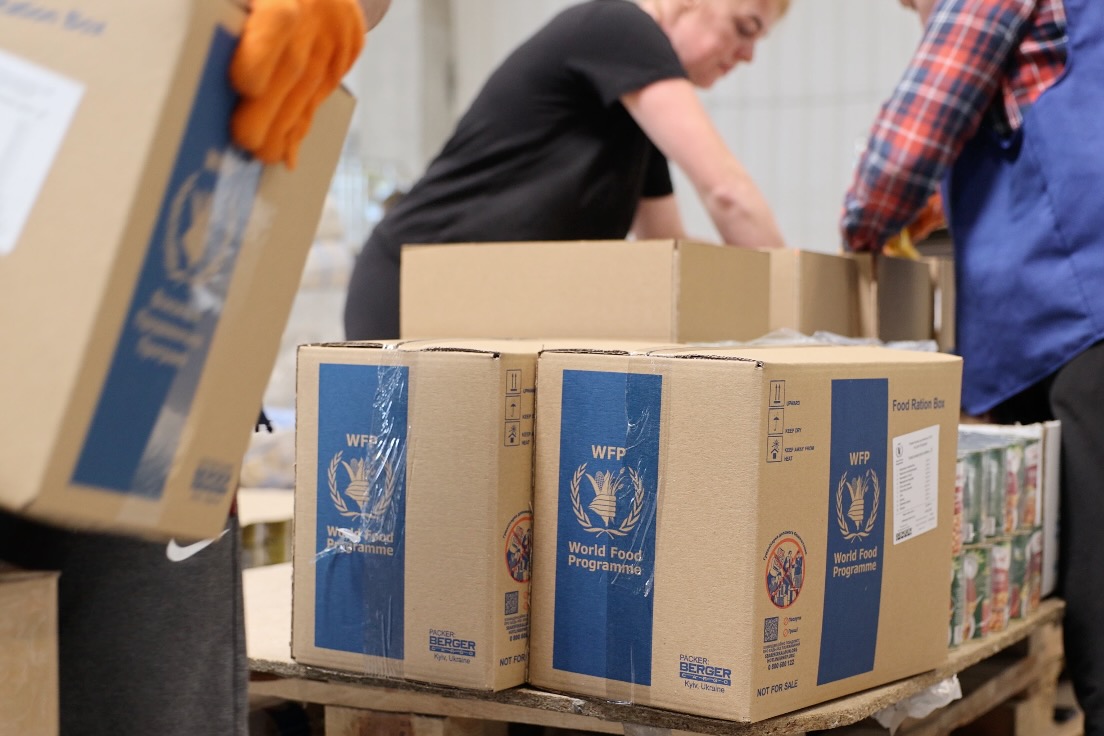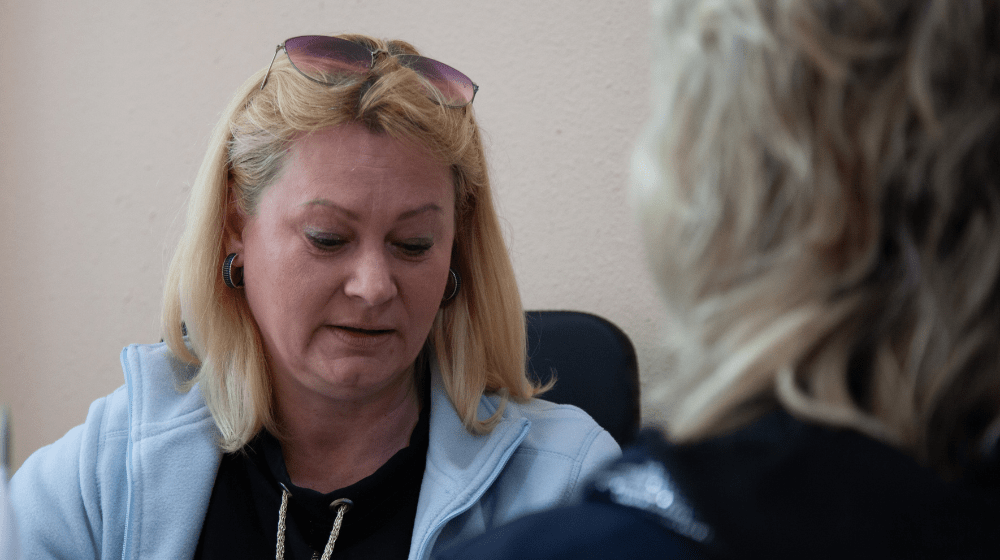"These difficult times have made me concerned about being able to provide the essentials for myself and my children. Receiving the food box helped. It gave me the feeling that I was not alone and that there were people who were willing to help" says Iryna, who received support at the Day Centre for psychosocial assistance to survivors of gender-based violence (GBV) in Poltava
Earlier this year, UNFPA and WFP collaborated to provide food boxes to survivors of violence in more than 50 UNFPA-supported across the country.
The partnership aimed to address the dual challenges of food insecurity and gender-based violence, offering critical support to those most affected.
A Comprehensive Approach to Support
As the war in Ukraine continues, attacks are intensifying across the country, civilian infrastructure, especially energy infrastructure, is regularly targeted. Social systems are weakening, and people are facing increased insecurity.
This includes risk factors to GBV. Gender-based violence, which disproportionately impacts women and girls, can cause significant psychosocial and physical harm, social stigma, and economic difficulties. The compounding factors of the ongoing war, such as men going to war and severe energy and economic insecurity, exacerbate these issues, making access to necessities like food even more critical.
Moreover, research shows that when women have less power and fewer resources, GBV can exacerbate food insecurity for women and girls. For example, women may be deprived of food by male partners or family members. Conversely, food insecurity can heighten the risk of violence against women and girls, as they may face sexual exploitation in their efforts to obtain food.
To address these risks and empower Ukrainian women, WFP and UNFPA Ukraine have launched an initiative to provide food assistance to GBV survivors. Most of the recipients are women and children, often internally displaced, who may face harm and exclusion, making it difficult for them to earn an income or care for their dependents.
Each 30-day food box contains essential items such as grains, pasta, and canned proteins. Additionally, WFP has also distributed food boxes that include informational booklets on accessing assistance for gender-based violence and available support services.
The initiative is aimed at strengthening national and municipal government systems and is implemented alongside UNFPA’s network of specialized services across Ukraine, including Day Centers, Crisis Rooms, Shelters, and Psychosocial Support Mobile Teams (PSS MTs). These services offer comprehensive support, from emergency housing and psychological care to legal and health services, ensuring survivors receive the holistic care they need.

Impact of the Collaboration
Since the inception of this initiative, over 2,250 food boxes have been delivered to 20 regions in Ukraine, including those most affected by the war. These packages, distributed at UNFPA-supported across Ukraine have reached women and children who have experienced domestic violence and displacement due to the war.
"Food packages are extremely necessary because not all women have sufficient income," says Viktoria Zheleznyak, a psychologist at the Daycare Center for Psychosocial Assistance in Kharkiv. "Some earn minimum wage, others are job hunting, or work temporary jobs. Among the recipients are many internally displaced persons who have left everything behind. Many have lost their homes and don’t know how they will move forward. So, when you offer them assistance, especially food, they are very grateful and often ask when they can receive more food packages."
One such recipient is Kateryna, who, along with her children, used to live in Kupyansk in the Kharkiv region, close to the front line. After her house was destroyed, she was forced to move to Kharkiv. " I met a man here and I moved in with my two children. But it turned out that he was violent. Later, I managed to borrow some money from friends. I called the police, and they were able to take me to safety in a crisis room in Kharkiv," she explains.
Having the space and resources allowed her to work on her next steps. With the help of her parents, she moved into a rented room and is now actively looking for work, while her mother supports with the children.
This collaboration has provided immediate relief and support to many like Kateryna, but the needs remain high.
Looking Ahead: Sustaining and Scaling up Efforts
As the humanitarian crisis in Ukraine continues to evolve, UNFPA and WFP are committed to adapting and expanding their support.
The initiative aims to address the immediate needs of women and their families during the war, as well as plan for long-term solutions to strengthen government systems of GBV prevention and response.
WFP plans to increase the distribution of food boxes to a wider number of UNFPA-supported services.
Voices of Hope
The real impact of these food boxes is best understood through the voices of those who have benefited while living next to the frontline.
One beneficiary, Tetiana, a mother of two from a de-occupied area, expressed, "I continue to live in Pokrovsk, Donetsk region. Because of the war, my husband lost his job, started drinking, and became aggressive towards me. One day, my daughter witnessed another fight and called the police. We were then referred to the Day Center, where they helped us restore our psychological well-being."
The Day Center workers provided Tetiana, who had no source of income, with food boxes from the WFP. "These packages have been a great help. Since I am on maternity leave and my husband is unemployed and not supporting us, the food boxes ensure we can eat properly," she says.
Tetiana's current priority is her children's safety. As the city becomes increasingly dangerous due to the war, she plans to leave soon.
***
The combined efforts of UNFPA and WFP are making a difference in the lives of many, providing food as well as a pathway to healing and resilience.
By Valentyn Puhachov


